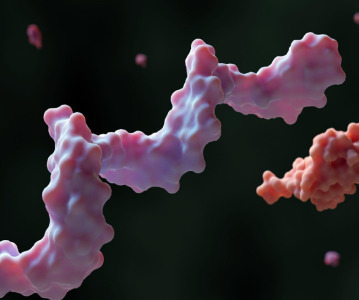Recruiting the Entire Immune System to Attack Cancer

The human immune system is poised to spring into action at the first sign of a foreign invader, but it often fails to eliminate tumours that arise from the body’s own cells. Cancer biologists hope to harness that untapped power using an approach known as cancer immunotherapy.
Orchestrating a successful immune attack against tumours has proven difficult so far, but a new study from MIT suggests that such therapies could be improved by simultaneously activating both arms of the immune system. Until now, most researchers have focused on one of two strategies: attacking tumours with antibodies, which activate the innate immune system, or stimulating T cells, which form the backbone of the adaptive immune system.
By combining these approaches, the MIT team was able to halt the growth of a very aggressive form of melanoma in mice.
“An anti-tumour antibody can improve adoptive T-cell therapy to a surprising extent,” says Dane Wittrup, the Carbon P. Dubbs Professor in Chemical Engineering at MIT. “These two different parts of the immune therapy are interdependent and synergistic.”
Wittrup, an associate director of MIT’s Koch Institute for Integrative Cancer Research and also a faculty member in the Department of Biological Engineering, is the senior author of a paper describing the work this week in the journal Cancer Cell. Lead authors are graduate students Eric Zhu and Cary Opel and recent PhD recipient Shuning Gai.
Enlisting the Immune System
Antibody drugs for cancer, which include rituximab and Herceptin, are believed to work by binding to cancer proteins and blocking the signals that tell cancer cells to divide uncontrollably. They may also draw the attention of cells belonging to the innate immune system, such as natural killer cells, which can destroy tumor cells.
Adoptive T-cell therapy, on the other hand, enlists the body’s T cells to attack tumours. Billions of T cells flow through the average person’s bloodstream at any given time, each specialized to recognize different molecules. However, many tumour proteins do not provoke T cells to attack, so T cells must be removed from the patient and programmed to attack a specific tumour molecule.
Wittrup and his colleagues made the discovery that they could generate both types of immune responses while they were experimenting with improving antibody drug performance with a signaling molecule called IL-2, which helps boost immune responses.
Scientists have tried this strategy before, and about a dozen such therapies have gone through Phase I clinical trials. However, most of these efforts failed, even though the antibody-IL-2 combination usually works very well against cancer cells grown in a lab dish.
The MIT team realized that this failure might be caused by the timing of IL-2 delivery. When delivered to cells in a dish, IL-2 sticks around for a long time, amplifying the response of natural killer cells against cancer cells. However, when IL-2 is injected into a patient’s bloodstream, the kidneys filter it out within an hour.
Wittrup and his colleagues overcame this by fusing IL-2 to part of an antibody molecule, which allows it to circulate in the bloodstream for much longer. In tests in mice with a very aggressive form of melanoma, the researchers found they could stop tumor growth by delivering this engineered form of IL-2, along with antibody drugs, once a week.
Immune Synergy
To their surprise, the researchers found that T cells were the most important component of the anti-tumour response induced by the antibody-IL-2 combination. They believe that the synergy of IL-2-induced cells and cytokines, and the antibody treatment, creates an environment that lets T cells attack more effectively.
“The antibody-driven innate response creates an environment such that when the T cells come in, they can kill the tumour. In its absence, the tumour cells establish an environment where the T cells don’t work very well,” Wittrup says.
Cells called neutrophils, which are considered the immune system’s “first line of defense” because they react strongly to foreign invaders that enter the skin through a cut or other injury, were also surprisingly important.
“They’re a really powerful force in your immune system, but people in immunotherapy don’t usually focus on neutrophils. They don’t really consider them as a viable tool,” Zhu says. “It pointed us to the idea that although T cells and natural killer cells are important, maybe we’re forgetting about a part of the immune system that is also really important and could help us achieve our goals of ultimately curing the tumours.”
The researchers also found that when they delivered an antibody, IL-2, and T cells targeted to the tumour, the adoptively transferred T cells killed cancer cells much more successfully than when only T cells were delivered. In 80–90% of the mice, tumours disappeared completely; even when tumour cells were reinjected into the mice months after the original treatment, their immune systems destroyed the cells, preventing new tumours from forming.
In a related paper that appeared recently in the Proceedings of the National Academy of Science, the MIT team also found that delivering IL-2 bound to any kind of antibody, even if the antibody did not target a protein on the tumour cell surface, would halt or slow tumour growth, especially if additional doses of the antibody alone were also given. Graduate student Alice Tzeng was the lead author of that study.
The researchers are now exploring additional proteins that could be added to the IL-2 and antibody combination to make immunotherapy more effective. In the meantime, simply giving patients more prolonged exposure to IL-2 could improve the effectiveness of existing antibody drugs, Wittrup says.
The research was funded by the National Cancer Institute, the National Institute for General Medical Sciences, and the National Science Foundation.
Related News
-
News Google-backed start-up raises US$600 million to support AI drug discovery and design
London-based Isomorphic Labs, an AI-driven drug design and development start-up backed by Google’s AI research lab DeepMind, has raised US$600 million in its first external funding round by Thrive Capital. The funding will provide further power t... -
News AstraZeneca to invest US$2.5 billion in Beijing R&D centre
Amid investigations of former AstraZeneca China head Leon Wang in 2024, AstraZeneca have outlined plans to establish its sixth global strategic R&D centre in China. Their aim is to further advance life sciences in China with major research and manufact... -
News Experimental drug for managing aortic valve stenosis shows promise
The new small molecule drug ataciguat is garnering attention for its potential to manage aortic valve stenosis, which may prevent the need for surgery and significantly improve patient experience. -
News How GLP-1 agonists are reshaping drug delivery innovations
GLP-1 agonist drug products like Ozempic, Wegovy, and Mounjaro have taken the healthcare industry by storm in recent years. Originally conceived as treatment for Type 2 diabetes, the weight-loss effects of these products have taken on unprecedented int... -
News A Day in the Life of a Start-Up Founder and CEO
At CPHI we work to support Start-Up companies in the pharmaceutical industry and recognise the expertise and innovative angles they bring to the field. Through our Start-Up Programme we have gotten to know some of these leaders, and in this Day in the ... -
News Biopharmaceutical manufacturing boost part of new UK government budget
In their national budget announced by the UK Labour Party, biopharmaceutical production and manufacturing are set to receive a significant boost in capital grants through the Life Sciences Innovative Manufacturing Fund (LSIMF). -
News CPHI Podcast Series: The power of proteins in antibody drug development
In the latest episode of the CPHI Podcast Series, Lucy Chard is joined by Thomas Cornell from Abzena to discuss protein engineering for drug design and development. -
News Amgen sues Samsung biologics unit over biosimilar for bone disease
Samsung Bioepis, the biologics unit of Samsung, has been issued a lawsuit brought forth by Amgen over proposed biosimilars of Amgen’s bone drugs Prolia and Xgeva.
Recently Visited
Position your company at the heart of the global Pharma industry with a CPHI Online membership
-
Your products and solutions visible to thousands of visitors within the largest Pharma marketplace
-
Generate high-quality, engaged leads for your business, all year round
-
Promote your business as the industry’s thought-leader by hosting your reports, brochures and videos within your profile
-
Your company’s profile boosted at all participating CPHI events
-
An easy-to-use platform with a detailed dashboard showing your leads and performance







.png)